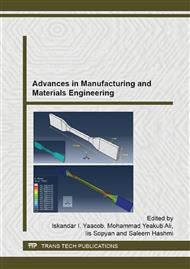p.422
p.426
p.433
p.440
p.446
p.450
p.454
p.458
p.462
Design and Development of a Solar Based Air Conditioning Blower System for Vehicle
Abstract:
A solar based air conditioning blower model of vehicle has been presented together with the development of its intelligent controller in this report. The model is dependent on its own battery that is recharged by the energy collected from solar panel system. An automatic variable speed blower is introduced into the system. Vehicle cabin temperature is controlled by varying the blower speed. The intelligent controller is embedded with fuzzy logic strategy. A control algorithm is obtained with a design of the model and the system. The results satisfied the project objectives. The system is able to run using a lead acid battery and a solar panel with power consumption of 98.4 W. The fuzzy logic controller performed well with a percentage error less than 1.64%.
Info:
Periodical:
Pages:
446-449
DOI:
Citation:
Online since:
July 2015
Authors:
Keywords:
Price:
Сopyright:
© 2015 Trans Tech Publications Ltd. All Rights Reserved
Share:
Citation:


